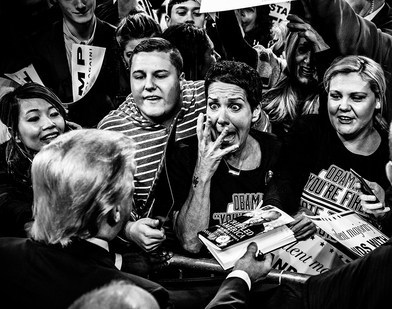I’m exhausted from the endless election season, the quarantine that requires me to be alone with my brain. (It’s a dangerous place to be.) I’m steeling myself for the anticipated drama in the days and weeks immediately after November 3rd that will no doubt be fraught with all manner of misinformation, outrage and God forbid, violence. Note to self: check zombie apocalypse inventories.

Mark Petersen, Political Theater (Skira)
No photographer has captured both sides of the political carnival that is the horrific rise of The Republic of Trump, as well as the general angst of our moment, more than Mark Peterson. You may recognize his images as the visual voice of the MSNBC political coverage from 2014 to 2016 but he continues to publish raw, cutting images across the aisle for numerous publications including Time, New York Times Magazine and Newsweek among many others. His images are much more artful than documentarian but because of their journalistic base, the pictures hit hard.
In Political Theater, a fantastic book from Skira, we happily get a compilation of his finest work during the aforementioned campaigns from Hell. Peterson reveals politicians from Hillary and Bernie to Sarah (as in Palin, the lipstick wearing pit bull) and of course, The Donald in all their flawed humanity. The title hints at the artifice of “imagineering” to borrow a word from Disney who coined the term to define the concrete realization of fantasy in his theme parks, but also rightly suggests intonations of war — as in theaters thereof.

Mark Petersen, Political Theater (Skira)
Co-opting a DIY ethos in a handheld flash and cheap smartphone app filters, Peterson sends up raw moments from the grueling campaign trail. The pop-flash whitewash on the pols’ faces contrasts with a dark outer ring that leaves a deep void. Inspired by Orson Welles’ cinematography in his landmark noir film, Citizen Kane, Peterson’s images carry both the weight of a labored fable and the weightlessness of a well-executed grift. Like the images that scrape against the screen in Touch of Evil — one of Welles’ later masterpieces — Peterson seems to channel the corruption portrayed by Welles’ own bloated visage crowding the frames of that movie. Political Theater is a powerful photographic record that captures the dramatic back-stage moments of our still fledgling democracy, exposing its characters in the footlights without their make-up.

Hippie Modernism (Walker Art Center)
The Oxford English Dictionary named “Post-Truth” the word of the year in 2016. Living in a world in which standards for objective truth seem to have disappeared, my word of the year for 2020 is just “Crazy-Town.” But I don’t yearn for a return to “normalcy” as some pitch the Biden/ Harris regime change. Not when “normal” means just eight individuals control half the world’s wealth. Something is seriously amiss. A strong desire among the populace for change and equity manifest in our current civil clashes with the supposed law and order president as resounding echoes of the turbulent 1960’s and 70’s, prompting me to recommend one of my all time favorite titles from the renown Walker Art Center. Hippie Modernism is the engaging catalog from the 2016 Walker exhibition of the same name. It examines the art, architecture and design of the counterculture movement and offers hope that we still might be able to Turn On, Tune In, and Drop Out into a new way of doing things. Or, depending on your perspective, at least it suggests what not to do this time around.

Hippie Modernism (Walker Art Center)
As my distributor describes it, “The catalog surveys the radical experiments that challenged societal norms while proposing new kinds of technological, ecological and political utopia. It includes the counter-design proposals of Victor Papanek and the anti-design polemics of Global Tools; the radical architectural visions of Archigram, Superstudio, Haus-Rucker-Co and ONYX; the installations of Ken Isaacs, Joan Hills, Mark Boyle, Hélio Oiticica and Neville D’Almeida; the experimental films of Jordan Belson, Bruce Conner and John Whitney; posters and prints by Emory Douglas, Corita Kent and Victor Moscoso; documentation of performances by the Diggers and the Cockettes; publications such as Oz and The Whole Earth Catalog; books by Marshall McLuhan and Buckminster Fuller; and much more.”
Both Political Theater and Hippie Modernism are timely books despite the years separating their publication dates. And still the old saw, “the more things change, the more they stay the same,” must be proven untrue. Please get out and vote.
Shop locally.



